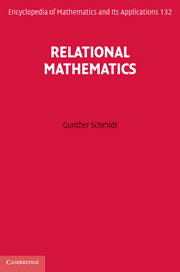Book contents
- Frontmatter
- Contents
- Notes on illustrations
- Preface
- 1 Introduction
- PART I REPRESENTATIONS OF RELATIONS
- PART II OPERATIONS AND CONSTRUCTIONS
- PART III ALGEBRA
- PART IV APPLICATIONS
- 12 Orderings: an advanced view
- 13 Preference and indifference
- 14 Aggregating preferences
- 15 Relational graph theory
- 16 Standard Galois mechanisms
- PART V ADVANCED TOPICS
- Appendix A Notation
- Appendix B Proofs postponed from Part II
- Appendix C Algebraic visualization
- Appendix D Historical annotations
- References
- Symbols
- Index
12 - Orderings: an advanced view
from PART IV - APPLICATIONS
Published online by Cambridge University Press: 05 May 2013
- Frontmatter
- Contents
- Notes on illustrations
- Preface
- 1 Introduction
- PART I REPRESENTATIONS OF RELATIONS
- PART II OPERATIONS AND CONSTRUCTIONS
- PART III ALGEBRA
- PART IV APPLICATIONS
- 12 Orderings: an advanced view
- 13 Preference and indifference
- 14 Aggregating preferences
- 15 Relational graph theory
- 16 Standard Galois mechanisms
- PART V ADVANCED TOPICS
- Appendix A Notation
- Appendix B Proofs postponed from Part II
- Appendix C Algebraic visualization
- Appendix D Historical annotations
- References
- Symbols
- Index
Summary
After one's first work with orderings, one will certainly come across a situation in which the concept of an ordering cannot be applied in its initial form, a high jump competition, for example. Here certain heights are given and athletes achieve them or not. Often, more than one athlete will reach the same maximum height, for example a whole class of athletes will jump 2.35 m high. Such a situation can no longer be studied using an order – one will switch to a preorder. We develop the traditional hierarchy of orderings (linear strictorder, weakorder, semiorder, intervalorder) in a coherent and proof-economic way. Intervalorders are treated in more detail since they have attracted much attention in their relationship with interval graphs, transitive orientability, and the consecutive 1s property. Block-transitive strictorders are investigated as a new and algebraically promising concept. Then we study how an ordering of some type can – by slightly extending it – be embedded into some more restrictive type; for example, a semiorder into its weakorder closure.
In a very general way, equivalences are related to preorders, and these in turn are related to measurement theory as used in physics, psychology, economic sciences, and other fields. Scientists have contributed to measurement theory in order to give a firm basis to social sciences or behavioral sciences. The degree to which a science is considered an already developed one depends to a great extent on the ability to measure.
- Type
- Chapter
- Information
- Relational Mathematics , pp. 303 - 348Publisher: Cambridge University PressPrint publication year: 2010

